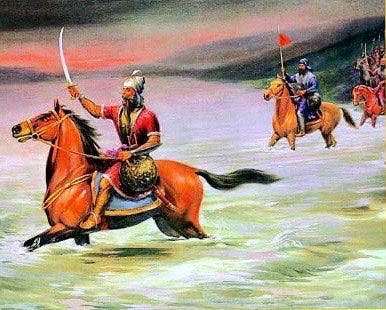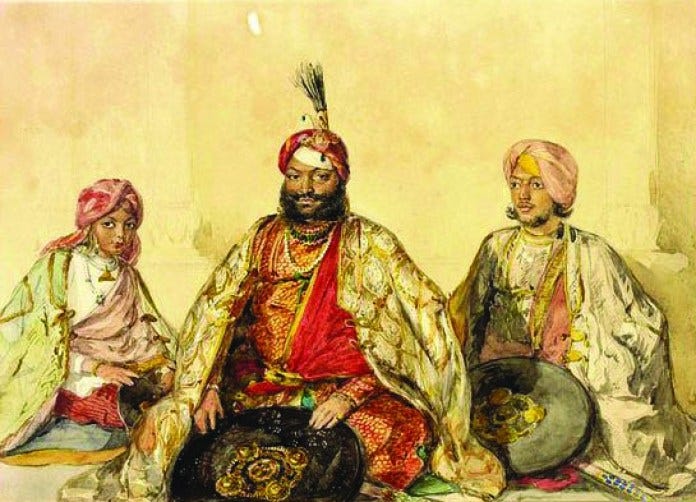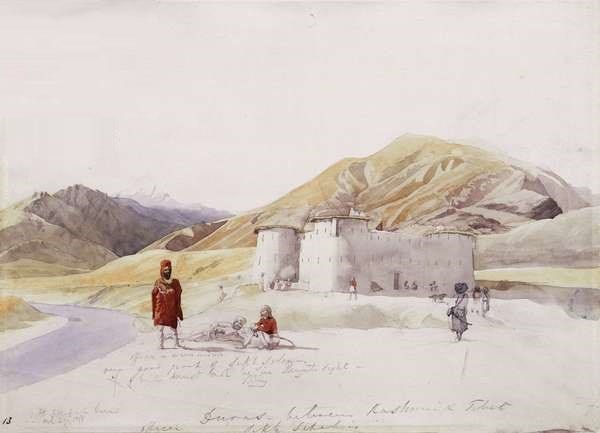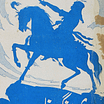Recollections of a Sikh warrior: The tales of Nihang Hardit Singh
Karam Singh Historian's interview of Nihang Hardit Singh, whilst in his service of the Sikh Empire, translated into English.
Foreword
On March 1st, 1905, Karam Singh met Nihang Hardit Singh. The elderly Nihang warrior was around 90-100 years old. He was in very good health and was able to remember minute details of the past. Nihang Hardit Singh’s father had also taken part in the early campaigns of Maharaja Ranjit Singh and he himself witnessed the rule of the Khalsa.
The Conquest of Attock
When Maharaja Ranjit Singh attacked Attock, my father took part. When the army reached near the city, they could not find a way to cross [the river Indus] and were left confused on what to do. An elderly religious Singh by the name of Hara Singh, who had lived there his entire life, met the Maharaja and showed him a way to cross. The Maharaja then distributed karah prasad to the army and threw 125 rupees into the river. They then crossed and first encamped near the village Pir Piani before advancing toward Yaru Sain. Mihan Singh, the governor of Kashmir, was with the forces during this time and was injured in the campaign.
The Time of Maharaja Sher Singh
“Mihan Singh [governor of Kashmir] had four boats. His soldiers asked for their salary (this was during the time of Maharaja Sher Singh) but he refused in an insulting manner. The Mazhabi Singhs then told the other Singhs that Mihan Singh should be killed. Everyone accepted and 200 Singhs got ready to do so.
Mihan Singh used to stay in the Shergarhi fort where he made an offering of five rupees daily to Guru Granth Sahib Ji. The Gurudwara was located right in the fort.
The guard at the gate informed Mihan Singh that the Singhs were coming but the governor was too intoxicated to take heed of the warning. The Singhs arrived at the fort around 9:00 PM with two cannons. They first requested that the Granthi should come out with Guru Granth Sahib Ji lest any desecration should take place. My father, who was the Granthi, came out of the fort with me and Guru Granth Sahib Ji. The soldiers then advanced.
It was raining heavily that day. Seeing the Singhs coming towards the fort, Malwai Khajan Singh yelled at the gatekeeper to not let them in so easily. The gatekeeper struck twice at the Singhs but he himself was killed in the end. Mihan Singh, who was still recovering from an illness at the time, blew out all the candles and went to hide to save his life. The Singhs found him in the darkness by poking around with their knives and bayonets. He was dragged outside and kept pleading for his life by saying he will give the soldiers their salary. But the Singhs refused. One Singh by the name of Talok Singh Mazhabi said that if he (Mihan Singh) was not killed right there, then all the soldiers would be killed one by one for rebelling. All agreed and Mihan Singh was killed. The Singhs then looted the treasury.
When news of this reached Lahore, Sheikh Imamuddin of Jalandhar was deputed to Kashmir. Taking Gulab Singh Dogra with him, he went to put down the rebellion. Talok Singh Mazhabi tried to rally the entire army behind him but failed. In the end, only two hundred soldiers stood with him. The battle was fierce and four thousand men were killed. Some of the rebels ran towards Punjab. Several of them were from our village too. The Sheikh claimed victory and restored peace. I was initially sent to my father Mahna Singh but Attar Singh then sent me to Hukam Singh for duty.”
Recounting a Battle in the Mountains
Nihang Hardit Singh narrates a campaign, in which he took part, sent to suppress the rebellious Muslim tribes in Kashmir. He along with several of his comrades were captured during the fighting. The following translation details what he witnessed after.
“We had been fighting for 16 days but did not give up the fort [in Karnah]. Finally Sher Ahmed came and stopped the fighting.
They agreed to let everyone else go but kept five of us. The captives were Jodh Singh (our officer), Hakam Singh, myself, Amira Misar and a Mehra. We were kept locked up in a house. Jodh Singh would always tell us never to become Muslim even if it meant death. After a few days, we were released and allowed to go to Jagraon Nagar. We had only gone a short distance when Jodh Singh noticed a Muslim with a gun following him. Knowing his intentions, Jodh Singh turned around and told the Muslim to come shoot him in front instead of hiding. The Muslim fired and the bullet passed through Jodh Singh’s kachera hitting him in the groin. He fell unconscious while the Muslim took his dumalla and ran away. Bhai Ji [Jodh Singh] came to his senses a few moments later. He sat up, tied a cloth around his head, and began doing paath. Once his paath was completed, he asked one of us to behead him with his Sri Sahib lest he suffers or the Muslims find him alive and stone him to death. At first none of us were willing to do so but upon his repeated demands, Hakam Singh agreed. Bhai Ji had a very long beard which he rolled up. He then exposed his neck and told Hakam Singh to strike. Hakam Singh’s first blow did not land properly and go through all the way. Bhai Ji bearing the pain calmly signalled him to strike him again. This blow did completely behead Bhai Ji. We then took his body and completed the funeral rites.”







